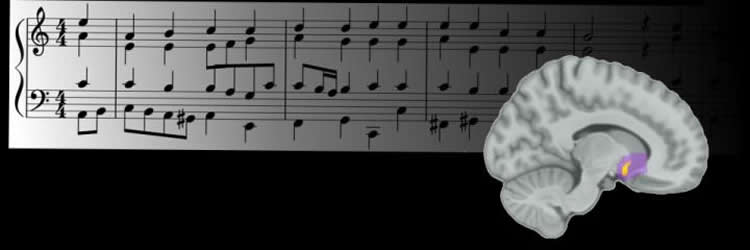Summary: A new study reports unexpected changes in music activates the nucleus accumbens, providing reward and helping us to learn about the music as we listen.
Source: McGill University.
If you love it when a musician strikes that unexpected but perfect chord, you are not alone. New research shows the musically unexpected activates the reward centre of our brains, and makes us learn about the music as we listen.
Researchers led by Ben Gold, a PhD candidate in the lab of Robert Zatorre at The Neuro (Montreal Neurological Institute and Hospital), of McGill University, put 20 volunteers through a musical reward learning task. Each participant chose a colour, then a direction. Each choice came with a certain probability of leading to either a consonant, pleasurable, musical excerpt or a dissonant, unpleasurable one. Over time the subjects learned which choices were more likely to produce both consonant and dissonant music.
The test was designed to create an expectation of either musical enjoyment or dissatisfaction. Subjects performed this task while their brain activity was measured with functional magnetic resonance imaging (MRI).
Using an algorithm, the researchers then determined the reward prediction error for each choice–the difference between an expected reward and the actual reward received. They compared that data to the MRI data, and found that reward prediction errors correlated with activity in the nucleus accumbens, a brain region that in previous studies has been shown to activate when the subject is experiencing musical pleasure. This is the first evidence that musically elicited reward prediction errors cause musical pleasure. It is also the first time an aesthetic reward such as music has been shown to create such a response. Previous studies have focused on more tangible rewards such as food or money.

Subjects whose reward prediction errors most closely matched activity in the nucleus accumbens also showed the most progress in learning the choices that led to the consonant tones. This establishes music as a neurobiological reward capable of motivating learning, showing how an abstract stimulus can engage the brain’s reward system to potentially pleasurable effect and motivate us to listen again and again.
“This study adds to our understanding of how abstract stimuli like music activate the pleasure centres of our brains,” says Gold. “Our results demonstrate that musical events can elicit formally-modeled reward prediction errors like those observed for concrete rewards such as food or money, and that these signals support learning. This implies that predictive processing might play a much wider role in reward and pleasure than previously realized
Funding: The study was published in the journal Proceedings of the National Academy of Sciences on Feb. 6, 2019. It was funded with a Fulbright Canada STEM Graduate Award and a Natural Sciences and Engineering Research Council-CREATE fellowship to Gold, and by a Foundation Grant from the Canadian Institutes of Health Research and a Canadian Institute for Advanced Research Senior Fellowship to Zatorre.
Source: Shawn Hayward – McGill University
Publisher: Organized by NeuroscienceNews.com.
Image Source: NeuroscienceNews.com image is credited to Ben Gold.
Original Research: Abstract for “Musical reward prediction errors engage the nucleus accumbens and motivate learning” by Benjamin P. Gold, Ernest Mas-Herrero, Yashar Zeighami, Mitchel Benovoy, Alain Dagher, and Robert J. Zatorre in PNAS. Published February 6 2019.
doi:10.1073/pnas.1809855116
[cbtabs][cbtab title=”MLA”]McGill University”The Unexpected Creates Reward When Listening to Music.” NeuroscienceNews. NeuroscienceNews, 12 February 2019.
<https://neurosciencenews.com/music-reward-unexpected-10724/>.[/cbtab][cbtab title=”APA”]McGill University(2019, February 12). The Unexpected Creates Reward When Listening to Music. NeuroscienceNews. Retrieved February 12, 2019 from https://neurosciencenews.com/music-reward-unexpected-10724/[/cbtab][cbtab title=”Chicago”]McGill University”The Unexpected Creates Reward When Listening to Music.” https://neurosciencenews.com/music-reward-unexpected-10724/ (accessed February 12, 2019).[/cbtab][/cbtabs]
Abstract
Musical reward prediction errors engage the nucleus accumbens and motivate learning
Enjoying music reliably ranks among life’s greatest pleasures. Like many hedonic experiences, it engages several reward-related brain areas, with activity in the nucleus accumbens (NAc) most consistently reflecting the listener’s subjective response. Converging evidence suggests that this activity arises from musical “reward prediction errors” (RPEs) that signal the difference between expected and perceived musical events, but this hypothesis has not been directly tested. In the present fMRI experiment, we assessed whether music could elicit formally modeled RPEs in the NAc by applying a well-established decision-making protocol designed and validated for studying RPEs. In the scanner, participants chose between arbitrary cues that probabilistically led to dissonant or consonant music, and learned to make choices associated with the consonance, which they preferred. We modeled regressors of trial-by-trial RPEs, finding that NAc activity tracked musically elicited RPEs, to an extent that explained variance in the individual learning rates. These results demonstrate that music can act as a reward, driving learning and eliciting RPEs in the NAc, a hub of reward- and music enjoyment-related activity.






